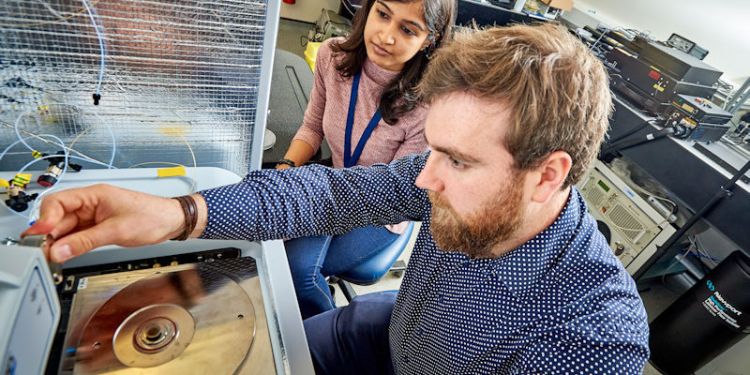
Dr Andrew Lee
- Course: Molecular Scale Engineering CDT
- Year of graduation: 2016
Developing novel analytical and material toolsets to discover new ways of tackling disease, cancers, and anti-microbial resistance
Dr Andrew Lee is a postdoctoral researcher at Leeds who carried out his PhD in the School of Electronic and Electrical Engineering. This was under the Centre for Doctoral Training in Molecular Scale Engineering.
His research involves developing novel analytical and material toolsets to directly observe the function of fundamental biological machines. He aims to tackle globally relevant challenges. Andy said:
“By directly observing these systems my research aims to pick apart their mechanisms and provide novel insight into the complex interactions that make us all tick. In doing this I hope to advance our understanding of the fundamental biology of life and discover novel ways to tackle diseases, cancers and globally relevant challenges such as anti-microbial resistance.”
He continued:
“I have always had a keen interest in understanding the fundamental mechanisms of biological systems: a hidden and vastly complex world of molecular machines that work tirelessly inside all of us, every day. This has led me to develop analytical and material toolsets with which to study these molecular machines directly at their own length and timescales.”
“My current work develops novel nanoscale structures woven from DNA molecules to act as extremely small ‘lab benches’ on which biological machines can be directly filmed using high-speed atomic force microscopy. If a picture speaks a thousand words, then a movie of a biological machine, one billionth of a metre in size, going about its business is about as exciting a story as I could ever have dreamt of writing.”
I hope to advance our understanding of the fundamental biology of life and discover novel ways to tackle diseases, cancers and globally relevant challenges such as anti-microbial resistance.

Encouraging supervisors
Andrew explained how the support he has received from peers and tutors helped him throughout his journey. He said:
“Throughout my PhD, my supervisors were incredibly supportive, from giving scientific advice and guiding my research. But also, with respect to my personal wellbeing and mental health. It can be a challenging and intense time studying for a PhD, but with great mentorship, it can be truly rewarding.”
Andrew continued:
“At the beginning of the project, my supervisor’s and my research interests were strongly aligned, in wanting to understand the mechanism of a specific biological system; homologous recombination by the protein Recombinase A. Although we were interested in this enzyme for different reasons, my supervisor for its bionanotechnological potential and me for its fundamental role in genetic maintenance.”
“In developing this research throughout my PhD, I drew on a lot of outside expertise and brought that into my supervisor’s research group, ultimately becoming more of an expert in the field than my supervisor and with my interests diverging along an associated tangent.”
Independent learning
Studying a PhD is challenging and demanding, but it is also extremely rewarding. Andrew explained how he developed new skills and broadened his ability to work independently. He said:
“It is important to develop that strong independence throughout your PhD that will help you establish yourself as a researcher after your PhD and diverge your interests from that of your supervisor whilst remaining true to the common research interests that initially brought you together in the first place.”
Researchers from different disciplines, cultures, and backgrounds
Many researchers comment on the supportive postgraduate atmosphere on campus. Andrew spoke about how he feels he is part of a large yet inclusive community, which has allowed him to grow personally and academically. He said:
“There is a very diverse and friendly community of researchers here at Leeds and a general open-door policy for academics. Throughout my PhD, I always found it easy to exploit connections across departments to seek topical advice, table discussions or to find novel solutions to my research problems in different disciplines.”
“There is a wide range of cultures, backgrounds and a good gender mix – which provides not only a balanced perspective on the research you are conducting, but also topical issues and your understanding of the world as a whole. Through the interaction with this diverse community, I grew as a person, not only as a researcher.”
...a wide range of cultures, backgrounds and a good gender mix... provides not only a balanced perspective on the research you are conducting... topical issues and your understanding of the world as a whole.
Building confidence
When he began his undergraduate degree at the University of Leeds, Andrew had no plans of pursuing any postgraduate study. Now, in his postdoctoral stage, he reflects on his development over his university career. Andrew said:
“A PhD was never something that was ever really on the cards when I began my time at the University of Leeds as a Biology undergraduate student. However, throughout those initial years, my confidence in myself as a scientist and my interest in research grew drastically, nurtured and supported by the enthusiastic academics I was engaging with and learning from.”
Andrew explained he decided to pursue research at the University due to the encouragement from students and staff. He said:
“I learnt a lot about myself beyond just the course content and became driven to pursue my interests as far as I could take them. It was really a direct push from my final year lab project supervisor who persuaded me to carry out a PhD. He wanted me to stick around in his lab that really made me think that a PhD was something I might be able to achieve.”
He continued:
“Various connections in the University guided me to research avenues that suited my interests, ultimately leading me to the Faculty of Engineering and the CDT in molecular-scale engineering which I applied for. I was accepted on the CDT and after many years of hard work I graduate with my PhD thesis being recognised by the University examination board for its academic excellence.”
He added:
“This story highlights two things for me that are I think are characteristic of my time at Leeds; the selfless and enthusiastic mentoring provided by the academics, and the diverse and dynamic range of interdisciplinary work that is conducted here, where you are not limited from crossing between faculties, disciplines and boundaries in pursuit of PhD success. In fact, it is actively encouraged.”
... the selfless and enthusiastic mentoring provided by the academics, and the diverse and dynamic range of interdisciplinary work that is conducted here... is actively encouraged.
Andrew is supervised by Professor Christoph Walti, who is investigating the major challenge of antimicrobial resistance.
Centres for Doctoral Training
Our CDT researchers automatically become members of the University’s Doctoral College.
Browse the current opportunities we are offering if you would like to know more.

